人教PEP版英语六年级下册《期末总复习_语法要点》课件
合集下载
PEP人教版小学英语六年级下册期末复习课件(全册)
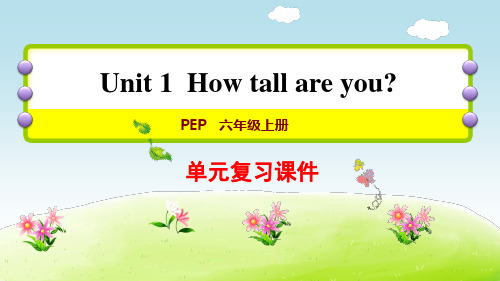
更小的 __s_m_a_l_l_er__ 12岁_1_2__y_e_a_r_s_o_ld__ 多重__h_o_w__h_e_a_v_y__
更强壮的__st_r_o_n_g_e_r 多高__h_o_w__t_a_l_l __ 多少号__w_h_a_t__si_z_e_
任务二:翻译重点句型 (两人一组,正确读出句子并翻译成汉语可得2分)
游戏规则: 按要求每完成一项任务即可获得相应的 分数,满10分即可获得一张王牌。
任务一:在习题本上写出下列单词或词组的过去 式并翻译成汉语,全部正确可得2分。
go_____w_e_n_t__去_______ ride__ro_d_e__骑__(__马__;__自__行__车__)_ hurt_h_u_r_t__(__使__)__受__伤__ eat_____a_te__吃_________ take ___t_o_o_k___拍__照_____ buy___b_o_u_g_h_t___买______ fall____fe_l_l__摔__倒_______ laugh____la_u_g_h_e_d___笑____
beautiful—more beautiful—most beautiful
任务四:看例子,说语法,学解题 (听老师讲例句,然后做下一页习题,全对可得2分)
You are__o_ld_e_r__ than me. 你比我年龄大。
解析: 这是用于比较两个人或事物的常见句型,句型 结构是:主语+be动词(am\is\are)+比较级+than+宾语。 年龄大用old,其比较级是older.
任务一:在习题本上写出下列单词的过去式并且
翻译成汉语,全部正确可得2分。
clean __c_le_a_n_e_d_打__扫___
PEP人教版六年级英语下册总复习课件

6
时间短语
• last weekend 上个周末 • last night 昨晚 • last Monday 上星期一 • yesterday 昨天 • the day before yesterday 前天 • 这些时间短语放在句尾,动词要用一般过
去式形式。
7
重要句型
• What did you do last weekend? • I stayed at home and watched TV . • 询问某人在过去的一段时间里做什么事情? • What+did +人称+do+表示过去的时间短语?
pep人教版六年级英 语下册英语复习
1
Unit 1
• 重要的语法-----形容词比较级变化规则 • 1) 单音节词和少数双音节词一般在词尾加er或est: • 如: small ---smaller --- the smallest • (2) 以不发音的e字母结尾的加r,或st: • 如: late --- later --- the latest • (3) 以辅音字母加y结尾的变y为I加er或est: • 如: easy --- easier --- the easiest • (4)以一个辅音字母结尾的重读闭音节词双写最后一个辅
后,双写最后辅音字母,再加-ed.如:plan— planned,refer—referred,regret—regretted,ban— banned.
5
重要单词和短语
• cleaned my room 打扫我的房间 • washed my clothes 洗衣服 • stayed at home 待在家里 • watched TV 看电视 • read a book 读书 • saw a film 看电影 • had a cold 感冒
时间短语
• last weekend 上个周末 • last night 昨晚 • last Monday 上星期一 • yesterday 昨天 • the day before yesterday 前天 • 这些时间短语放在句尾,动词要用一般过
去式形式。
7
重要句型
• What did you do last weekend? • I stayed at home and watched TV . • 询问某人在过去的一段时间里做什么事情? • What+did +人称+do+表示过去的时间短语?
pep人教版六年级英 语下册英语复习
1
Unit 1
• 重要的语法-----形容词比较级变化规则 • 1) 单音节词和少数双音节词一般在词尾加er或est: • 如: small ---smaller --- the smallest • (2) 以不发音的e字母结尾的加r,或st: • 如: late --- later --- the latest • (3) 以辅音字母加y结尾的变y为I加er或est: • 如: easy --- easier --- the easiest • (4)以一个辅音字母结尾的重读闭音节词双写最后一个辅
后,双写最后辅音字母,再加-ed.如:plan— planned,refer—referred,regret—regretted,ban— banned.
5
重要单词和短语
• cleaned my room 打扫我的房间 • washed my clothes 洗衣服 • stayed at home 待在家里 • watched TV 看电视 • read a book 读书 • saw a film 看电影 • had a cold 感冒
人教PEP版英语六年级下册《期末总复习 句型》课件

1. When do you eat dinner?
I eat dinner at 7:00 in the evening.
2. When do you get up?
I usually get up at 12:00 noon.
3. What do you do on the weekend?
Usually I watch TV and go shopping. Sometimes I visit my grandparents. 4. I often play football. Sometimes I go hiking.
Homework: 1、复习单词表…年级…册 Unit…。 2、完成《英语小屋》第… 页。
34. I like fruit.
But I don’t like grapes. They’re sour.
35. What can you do?
36. Can you make the bed? No, I can’t. 37. Can you use a computer? Yes, I can. 38.There are two bedrooms, a kitchen,
Mom is cooking dinner in the kitchen.
I’m doing the dishes. I’m reading a book.
16.He is writing an e-mail in the study.
17. What is it doing?
It’s eating bananas.
18. What is she doing? She’s jumping. 19. What are they doing?
人教PEP六年级英语下册期末复习整理PPT课件
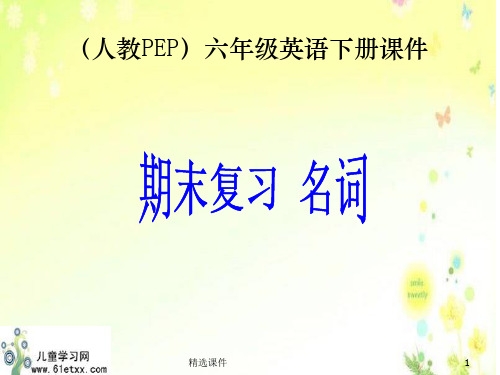
21
将下列单数句变为复数句: 1 This is a book . 2 Is that a pen? 3 She is a girl . 4 I like her. 5 The book is mine. 6 This is her pen. 7 I am a teacher. 8 He is a boy student . 9 She is a woman worker. 10 He likes his bike.
8 These are(some)books .
9 Are those(any)pens?
10They like my bikes.
单数句变复数句歌谣:
单数句变复数句, 代词四变要记住。
连系动词 am is 变成 are。
冠词a an要去掉,改为some,any也可以。
句式不要变精,选课十件全十美题做完。
foot ____f_e_e_t ___ photo__p_h_o__to_e_s__
radio___r_a_d_io_s___ tomato_t_o_m_a_t_o_e_s_
woman__w_o__m_e_n__ knife___k_n_iv_e_s___
sheep___s_h__e_e_p__ ship____s_h_ip_s___
tomato
tomatoes
potato
potatoes
hero
heroes
口诀:英雄喜欢吃西红柿和土豆。
注意: photo
photos (照片)
精选课件
9
规则4:以f,fe结尾变f, fe为ves;
leaf
wolf life wife thief shelf
leaves knife wolves lives wives thives
六年级英语下册《期末总复习》PPT课件(人教PEP版).ppt
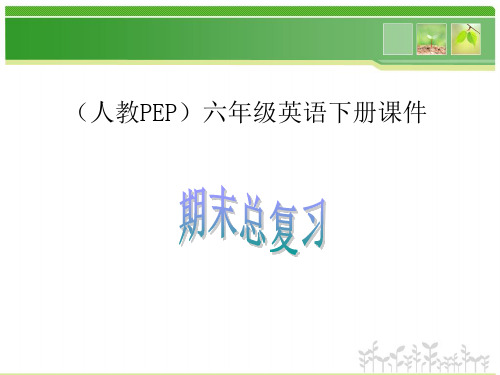
My birthday is Dec.25th ,it’s Christmas Day,it’s in winter. It’s my favourite season.So my favourite colour is white, I like eating turkeys very much. In winter,I often skate with my father. I like it so much,that’s my hobby and I can skate very well. I have a dream of being a figure skater(花样滑冰运动 员) one day. My idol is Shen xun and Zhao hongbo.
Favourite colour
Dream:
Hobby
being a figure skater
DreaIdmol: Shen Xue
Idol
Zhao Hongbo
Show yourself.
• 一级: • You can write a page of the class
book to the teacher.
pianist
director
dancer
Amy’s dream
• What’s Amy’s dream? • Who’s Amy’s Idol?
Remember Me
I am Amy.It’s the end of my primary school. It’s time to say goodbye to my friends. I hope my classmates can rememer me .
Dream
Favourite colour
Dream:
Hobby
being a figure skater
DreaIdmol: Shen Xue
Idol
Zhao Hongbo
Show yourself.
• 一级: • You can write a page of the class
book to the teacher.
pianist
director
dancer
Amy’s dream
• What’s Amy’s dream? • Who’s Amy’s Idol?
Remember Me
I am Amy.It’s the end of my primary school. It’s time to say goodbye to my friends. I hope my classmates can rememer me .
Dream
期末复习(课件)人教PEP版英语六年级下册
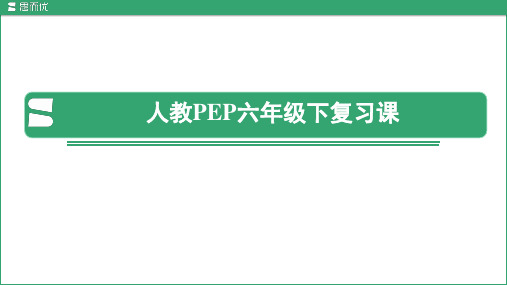
Let’s +动原(表示让我们做某事)want to+动原(表示想要去做某事)couldn’t+动原(表示不能做某事)didn’t+动原(表示不……)
all
一、把正确选项的序号填入题前的括号中。( )1. – What _____you ____yesterday? A. do;do B. did;do C. did;did( ) 2.-Did you ________TV last weekend? A. watch B.watches C.watched( )3.Did you read a book yesterday? –Yes, I______ A. do B. didn’t C. did( ) 4.Let’s _______to the bookstore. A. go B goes C went
比较级:形容词+er +than
注意比的写法----
than
(它比我们俩加起来还要高)
both:两个都
3.Those shoes in the window are nice!
(在橱窗里的那些鞋子真美丽啊!)
4.Let’s have a look.(让我们看一看)
固定搭配:1.have a look看一看 2.have a good time=have fun(玩的开心)
1.一般情况直接加er,
2.以e结尾要加r。
3.辅音字母加y,把y变i直接加er。
4.重读辅元辅,双写最后一个字母加er。
如:stronger
如:finer nicer
如:heavier happier
如:bigger,thinner
What's he like?
all
一、把正确选项的序号填入题前的括号中。( )1. – What _____you ____yesterday? A. do;do B. did;do C. did;did( ) 2.-Did you ________TV last weekend? A. watch B.watches C.watched( )3.Did you read a book yesterday? –Yes, I______ A. do B. didn’t C. did( ) 4.Let’s _______to the bookstore. A. go B goes C went
比较级:形容词+er +than
注意比的写法----
than
(它比我们俩加起来还要高)
both:两个都
3.Those shoes in the window are nice!
(在橱窗里的那些鞋子真美丽啊!)
4.Let’s have a look.(让我们看一看)
固定搭配:1.have a look看一看 2.have a good time=have fun(玩的开心)
1.一般情况直接加er,
2.以e结尾要加r。
3.辅音字母加y,把y变i直接加er。
4.重读辅元辅,双写最后一个字母加er。
如:stronger
如:finer nicer
如:heavier happier
如:bigger,thinner
What's he like?
人教PEP版英语六下《期末总复习》主要句型PPT课件
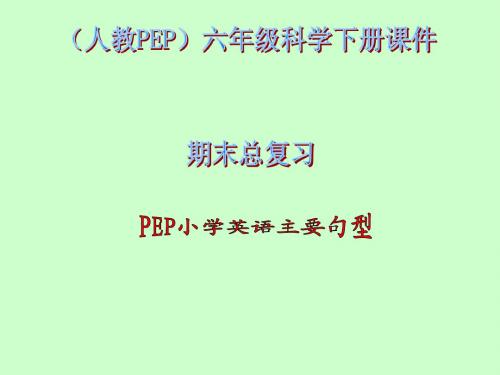
1. How do you go to school, Sarah?
Usually I go to school on foot. Sometimes I go to school by bike. 2. How can I get to Zhongshan Park?
You can go by the No.15bus.
1. When do you eat dinner?
I eat dinner at 7:00 in the evening.
2. When do you get up?
I usually get up at 12:00 noon.
3. What do you do on the weekend?
Usually I watch TV and go shopping. Sometimes I visit my grandparents. 4. I often play football. Sometimes I go hiking.
3. Where is the cinema, please?
Байду номын сангаас
It’s next to the hospital.
4. Turn left at the cinema, then go straight. It’s on the left.
5. What are you going to do on the weekend? I’m going to visit my grandparents this weekend. 6. Where are you going this afternoon? I’m going to the bookstore. 7. What are you going to buy? I’m going to buy a comic book. 8. What’s your hobby? I like collecting stamps.
Usually I go to school on foot. Sometimes I go to school by bike. 2. How can I get to Zhongshan Park?
You can go by the No.15bus.
1. When do you eat dinner?
I eat dinner at 7:00 in the evening.
2. When do you get up?
I usually get up at 12:00 noon.
3. What do you do on the weekend?
Usually I watch TV and go shopping. Sometimes I visit my grandparents. 4. I often play football. Sometimes I go hiking.
3. Where is the cinema, please?
Байду номын сангаас
It’s next to the hospital.
4. Turn left at the cinema, then go straight. It’s on the left.
5. What are you going to do on the weekend? I’m going to visit my grandparents this weekend. 6. Where are you going this afternoon? I’m going to the bookstore. 7. What are you going to buy? I’m going to buy a comic book. 8. What’s your hobby? I like collecting stamps.
人教PEP版英语六年级下册《期末总复习 句型》课件

28. What day is it today?
It’s Wednesday.
29. What do you have on Thursdays? We have English, math and science on Thursdays. 30. What do you do on Saturdays? I watch TV on Saturdays. 31. What about you? I do my homework, too. 32. What do you have for lunch on Mondays? We have tomatoes, tofu and fish. 33. What’s your favourite fruit, Monkey? I like apples. They’re sweets.
17. What is it doing? It’s eating
bananas.
18. What is she doing? She’s
jumping.
19. What are they doing? They’re
swimming. They’re climbing trees.
20. Are you eating lunch? No, we
aren’t.
21. Are they eating the honey? Yes,
they are.
22. Is he playing chess? Yes, he
23. Is she counting insects?
No, she isn’t.
24. Who’s your English teacher?
5. Which season do you like best?
It’s Wednesday.
29. What do you have on Thursdays? We have English, math and science on Thursdays. 30. What do you do on Saturdays? I watch TV on Saturdays. 31. What about you? I do my homework, too. 32. What do you have for lunch on Mondays? We have tomatoes, tofu and fish. 33. What’s your favourite fruit, Monkey? I like apples. They’re sweets.
17. What is it doing? It’s eating
bananas.
18. What is she doing? She’s
jumping.
19. What are they doing? They’re
swimming. They’re climbing trees.
20. Are you eating lunch? No, we
aren’t.
21. Are they eating the honey? Yes,
they are.
22. Is he playing chess? Yes, he
23. Is she counting insects?
No, she isn’t.
24. Who’s your English teacher?
5. Which season do you like best?
相关主题
- 1、下载文档前请自行甄别文档内容的完整性,平台不提供额外的编辑、内容补充、找答案等附加服务。
- 2、"仅部分预览"的文档,不可在线预览部分如存在完整性等问题,可反馈申请退款(可完整预览的文档不适用该条件!)。
- 3、如文档侵犯您的权益,请联系客服反馈,我们会尽快为您处理(人工客服工作时间:9:00-18:30)。
当主语为第三人称单数时,要用doesn‘t构成 否定句。 如:He doesn't often play. 一般疑问句: Do( Does ) +主语+动词原形+其它。如:Do you often play football?- Yes, I do. / No, I don't. 当主语为第三人称单数时,要用does构成一般 疑问句。 如:- Does she go to w/ No, she doesn't.特殊疑问句: 疑问词+一般疑问句。如:How does your father go to work?
☆其中how又可以和其他一些形容词连用组 成特殊疑问词组用来提问,如: how many (多少 ( 数量 ) ) , how much (多少 ( 钱 ) ) , how tall(多高), how long(多长), how big(多大), how heavy(多重) 例句:How many pencils do you have? I have three pencils. How many girls can you see? I can see four girls. How many desks are there in your classroom? There are 51.
现在进行时的否定句在be后加not。 She is not taking pictures. He isn’t climbing moutains. 4.现在进行时的一般疑问句把be动词 调到句首。Is he reading a book? Is the rabbit running ?
5.现在进行时的特殊疑问的基本结构 为:疑问词不达意 + be + 主语 + 动 词ing? 但疑问词当主语时其结构为: 问词不达意 + be + 动词ing?
形容词比较级复习 1、形容词比较级在句子中的运 用:两个事物或人的比较用比 较级,比较级后面一般带有单 词than。比较级前面可以用 more, a little 来修饰表示程 度。than后的人称代词用主格 (口语中可用宾格)。
2.形容词加er的规则:⑴一般在词尾加 er ;short-shorter small-smaller ⑵ 以字母e 结尾,加r ;fine-finer latelater ⑶以一个元音字母和一个辅音字母结尾, 应双写末尾的辅音字母,再加er ;bigbigger thin-thinner fat-fatter ⑷以“辅音字母+y”结尾,先把y变i,再 加er 。easy-easier heavy-heavier early-earlier 3.不规则形容词比较级: good-better, beautiful-more beautiful
4 、特殊疑问句:以特殊疑问词( what , where , who , which , when , whose , why , how 等)开头引导的句子。此类句子应该 问什么就答什么,不能用“yes 、no”来回 答。如: What is this? It’s a computer. What does he do? He’s a doctor. Where are you going? I’m going to Beijing. Who played football with you yesterday afternoon? Mike.
动词过去式变化规则: 1.一般在动词末尾加-ed,如:pullpulled, cook-cooked
2.结尾是e加d,如:taste-tasted 3.末尾只有一个元音字母和一个辅音字 母的重读闭音节,应双写末尾的辅音字母, 再加-ed,如:stop-stopped 4.以“辅音字母+y”结尾的,变y为i, 再加-ed,如:study-studied
动词加ing的变化规则
1.一般情况下,直接加ing,如:cookcooking 2.以不发音的e结尾,去e加ing,如:makemaking, taste-tasting take-taking
3.如果末尾是一个元音字母和一个辅音字母, 双写末尾的辅音字母,再加ing,如:runrunning, stop-stopping swimswimming
Which season do you like best? Summer. When do you usually get up? I usually get up at 6:30. Whose skirt is this? It’s Amy’s. Why do you like spring best? Because I can plant trees. How are you? I’m fine. / I’m happy. How did you go to Xinjiang? I went to Xinjiang by train.
四、根据答句写出问句 (1) I’m 160 cm. (2) I’m 12 years old. (3) My shoes are 80 yuan. (4) Amy’s hair is 30 cm long. (5) I have three English books.
⑶带有was或were的句子,其否定、疑问的变 化和is, am, are一样,即否定句在was或were 后加not,一般疑问句把was或were调到句首。 3.句中没有be动词的一般过去时的句子 否定句:didn’t +动词原形,如:Jim didn’t go home yesterday. 一般疑问句:在句首加did,句子中的动词过 去式变回原形。如:Did Jim go home yesterday? 特殊疑问句:⑴疑问词+did+主语+动词原形? 如: What did Jim do yesterday? ⑵疑问词当主语时:疑问词+动词过去式? 如:Who went to home yesterday?
一、 一般现在时:
1.表示事物或人物的特征、状态。 如:The sky is blue.天空是蓝色的。 He is a boy 他是个男孩 she has long hair .她有长头发
2.表示经常性或习惯性的动作。如:I get up at six every day.我每天六 点起床。一般的时间词有:often , sometimes ,everyday ,usually
现在进行时
1.现在进行时表示现在正在进行或发 生的动作,也可表示当前一段时间内 的活动或现阶段正在进行的动作。He is taking pictures. 2.现在进行时的肯定句基本结构为 be+动词ing. The monkey is swinging. She is cooking dinner . he is doing his homework.
一般现在时的变化 1. be动词的变化。否定句:主语+ be + not +其它。如:He is not a worker.他不是工人。 一般疑问句:Be +主语+其它。如:-Are you a student? -Yes. I am. / No, I'm not. 特殊疑问句:疑问词+一般疑问句。如: Where is my bike? 2.行为动词的变化。否定句:主语+ don't( doesn't ) +动词原形(+其它)。 如:I don't like bread.
heavy tall long much many big far often (1) How is the Yellow River? (2) How is Mr Green? He’s 175cm. (3) How are your feet? I wear size 18. (4) How is the white T-shirt? It’s 100 yuan. (5) How apples are there in the bag? There are 5. (6) How is the fish? It’s 2kg.
将来时理论 一、 概念:表示将要发生的动作或存在的状态 及打算、计划或准备做某事。句中一般有以下时 间状语:tomorrow, next day(week, month, year…),soon, the day after tomorrow(后 天)this morning , this afternoon , this evening等。 二、基本结构:①be going to + do;wuyifan is going to visit his grandparents next weekend . amy is going to climb mountains tomorrow. ②will+ do. He will go shopping this afternoon. He will go to shanghai next month .
一般现在时的构成
1. be动词:主语+be(am,is,are)+其它。 如: I am a boy.我是一个男孩。He is a student .他是一个学生 2.行为动词:主语+行为动词(+其它)。 如: We study English.我们学习英语。 当主语为第三人称单数(he, she,it)时, 要在动词后加"-s"或"-es"。如:Mary likes Chinese.玛丽喜欢汉语。
动词+s的变化规则
1.一般情况下,直接加-s,如:cook-cooks, milk-milks
2.以s. x. sh. ch. o结尾,加-es,如: guess-guesses, wash-washes, watchwatches, go-goes
